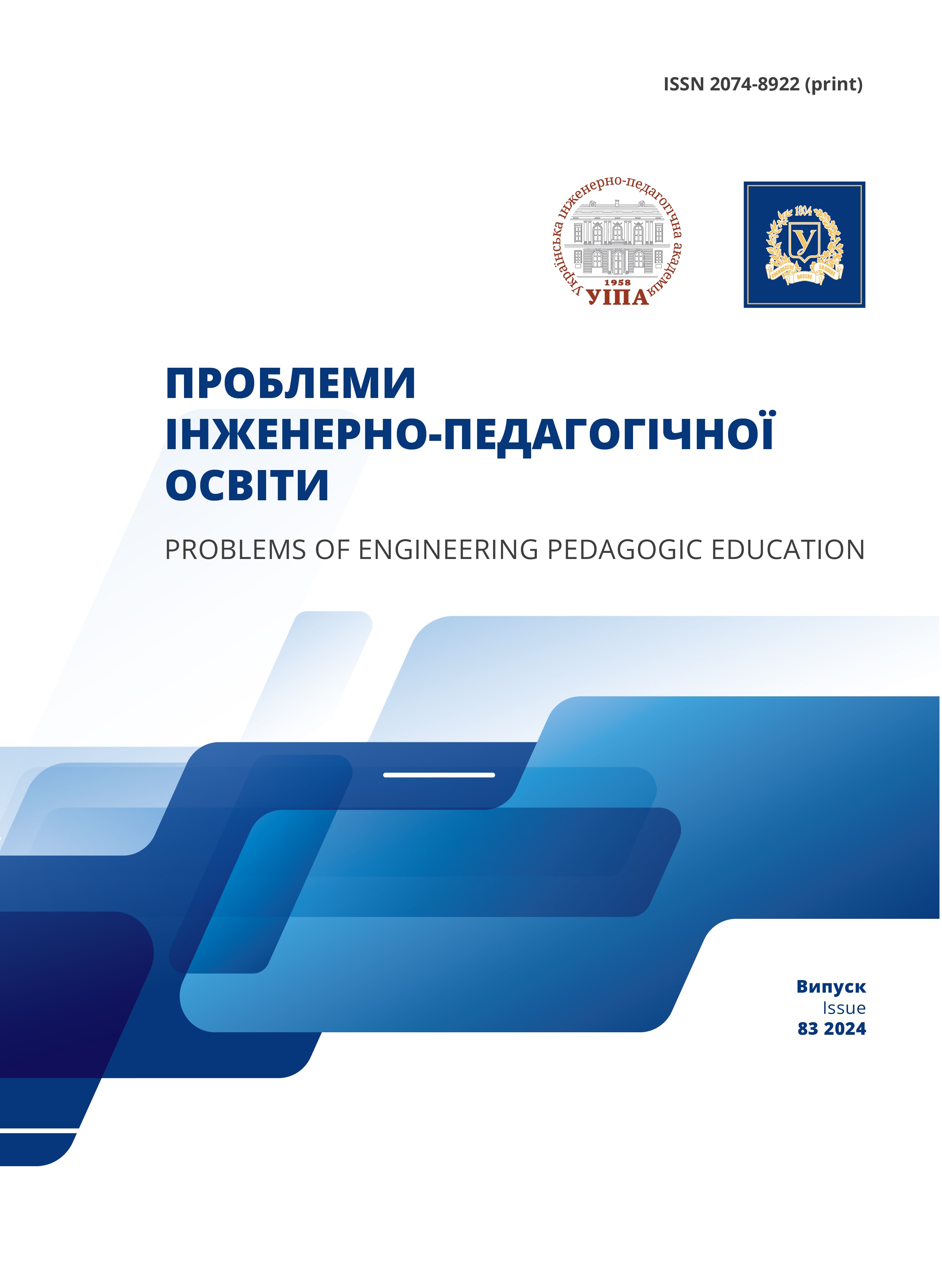EDUCATIONAL WEB RESOURCE “C# PROGRAMMING”
Abstract
DOI: https://doi.org/10.26565/2074-8922-2024-83-21
Although Ukraine is actively developing the use of web-resources in the educational process, the level of integration still does not reach the level observed in most European countries. In the EU, the implementation of web-resources in education is part of national digitalization strategies and is actively integrated into teaching methodologies. Ukraine needs to continue working on teacher training and increasing state support for digital initiatives in education to reach European standardsю
The article substantiates the important role of the systematic use of educational web - resources in the process of professional training of future engineers-pedagogues, which is one of the requirements of higher education informatization and directly affects the ability and desire of future specialists to use educational web resources in their professional activities. This study analyzes the state of implementation and use of digital educational resources in the educational process during distance learning to develop digital and programming competencies in students. The implementation of the educational and professional programs (EPP) “Computer Science” and “Vocational Education. Digital Technologies", of course, requires the development of curricula, and as a result, educational components. The educational components of both EPPs require the study of programming languages. Due to the conducted analysis of scientific sources in the IT and pedagogical spheres, the expediency of developing and implementing the educational web - resource “Programming in C#” in the educational process is scientifically substantiated. The authors analyzed the existing classifications of educational web - resources and developed their vision of the architecture and content of the author's development. The proposed educational web - resource is a practical result of the research work conducted within the framework of the international project “MOOC-based micro-credentials for teacher professional development” of the Erasmus+ program.
In cites: Sazhko H., Ptashnyi O., Chaika A., Sivitskyi V. (2024). Educational web resource "C# Programming". Problems of Engineering Pedagogic Education, (83), 242-253. https://doi.org/10.26565/2074-8922-2024-83-21 (in Ukrainian)
Downloads
References
Strategy for reforming higher education in Ukraine for 2022-2032. Ministry of Education and Science of Ukraine. https://zakon.rada.gov.ua/laws/show/286-2022-%D1%80#Text (in Ukrainian).
Feijoo, Claudio, Fernández, Javier, Arenal, Alberto, Armuña, Cristina, Ramos, Sergio (2021). Educational technologies in China, Publications Office of the European Union, Luxembourg. https://dx.doi.org/10.2760/604641
Digital competence framework for Ukrainian citizens. Ministry of Digital Transformation of Ukraine (2023). https://thedigital.gov.ua/news/pidvishchennya-rivnya-tsifrovikh-navichok-ukraintsiv-doluchaytesya-do-obgovorennya-proektu-ramki-tsifrovoi-kompetentnosti-gromadyan (in Ukrainian).
Nechuiviter, O., Sazhko, H., Kovalchuk, A. (2022). Digitalization of the Educational Process of Training Future Engineering-Teachers. In: Hu, Z., Zhang, Q., Petoukhov, S., He, M. (eds.) Advances in Artificial Systems for Logistics Engineering. ICAILE 2022. Lecture Notes on Data Engineering and Communications Technologies, 135, 204–213. Springer, Cham https://doi.org/10.1007/978-3-031-04809-8_18 (in Ukrainian).
Sazhko, H., Nechuiviter, O., Kovalchuk, A., Fatieieva, L. (2023). The Formation of a Virtual Educational Environment as an Element in the System of Improving the Digital Competences of Teachers. In: Auer, M.E., Cukierman, U.R., Vendrell Vidal, E., Tovar Caro, E. (eds.) Towards a Hybrid, Flexible and Socially Engaged Higher Education. ICL 2023. Lecture Notes in Networks and Systems, 900, 47-54. Springer, Cham https://doi.org/10.1007/978-3-031-52667-1_6 (in Ukrainian).
Skurativska, M., Popadyuk, S. (2017). Virtual educational environment as an innovative component of the educational process in higher education. Collection of research papers “Pedagogical sciences”, LXXX (2), 251–255. http://nbuv.gov.ua/UJRN/znppn_2017_80(2)__53 (in Ukrainian).
Telyatnik, K., Sokol, I. (2015). Creation of a virtual educational environment using modern Internet services. Bulletin of Zaporizhzhia National University. Pedagogical Sciences, 1(24), 183–190. http://nbuv.gov.ua/UJRN/Vznu_ped_2015_1_30 (in Ukrainian).
Law of Ukraine on Education (2017). The Official Bulletin of the Verkhovna Rada of Ukraine, 38–39, 380. https://olgopil.osv.org.ua/zakon-ukraini-pro-osvitu-%E2%84%962145viii-vidomosti-verhovnoi-radi-ukrainii-2017-%E2%84%963839st380-21-52-28-20-04-2021/ (in Ukrainian).
On Education: Law of Ukraine dated September 5, 2017 No. 2145-VIII (2017). https://zakon.rada.gov.ua/laws/show/2145-19#Text (last accessed 2021/09/17). (in Ukrainian).
Project Concept of digital transformation of education and science for the period until 2026: Ministry of Education and Science of Ukraine, published on May 25, 2021. (2021). https://mon.gov.ua/ua/news/koncepciya-cifrovoyi-transformaciyi-osviti-i-nauki-mon-zaproshuye-do-gromadskogo-obgovorennya (last accessed 2023/4/20). (in Ukrainian).
On the approval of the road map for the integration of the scientific and innovative system of Ukraine into the European research area: the order of the Ministry of Education and Science of Ukraine dated February 10, № 167 (2021). https://mon.gov.ua/storage/app/media/rizne/2021/02/12/edp-nakaz.pdf (in Ukrainian).
TIOBE Index for May 2024. https://www.tiobe.com/tiobe-index/ (last accessed 2024/05/21).
Rating of programming languages (2024). https://dou.ua/lenta/articles/language-rating-2024/ (last accessed 2024/05/21).
Kovalenko, O., Koeberlein-Kerler, J., Briukhanova, N., Korolova, N., Bozhko, N., Lytvyn, O. (2023). Preparation of Students of Engineering and Pedagogical Specialties for the Development and Implementation of Interdisciplinary Didactic Projects Using IT-Technologies. In: Auer, M.E., Pachatz, W., Rüütmann, T. (eds.) Learning in the Age of Digital and Green Transition. ICL 2022. Lecture Notes in Networks and Systems, 634. Springer, Cham. https://doi.org/10.1007/978-3-031-26190-9_31 (in Ukrainian).
ISBD(ER): International Standart Bibliographic Description for Electronic Resources. https://www.ifla.org/files/assets/cataloguing/isbd/isbder.pdf (last access 2023/11/15).
Quality Principles for Cultural Websites: a Handbook. Rome: La Tipografia, Italy, 66 р. (2005). http://www.minervaeurope.org/publications/qualitycommentary/qualitycommentary050314final.pdf (last access 2023/11/15).
Sitbon B. J. (2019). Step-By-Step Guide: How to Make a Professional Website in 2019. https://www.wix.com/blog/2019/03/how-to-make-website-guide (last access 2023/11/19).

